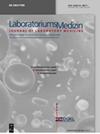检验医学的数字化能力
IF 0.1
Q4 OTORHINOLARYNGOLOGY
Laboratoriumsmedizin-Journal of Laboratory Medicine
Pub Date : 2023-04-19
DOI:10.1515/labmed-2023-0021
引用次数: 1
摘要
尽管大多数检验医学的医生和专业人员都接受过统计学的基本培训,但经验表明,对数据分析的一般理解尚未在广泛的范围内实现。因此,数据素养、数据驱动决策和计算思维应该在未来的教育培训中实施。为了评估检验医学领域年轻科学家(YS)的数字能力状况,我们发起了一项全球在线调查。方法从2022年5月25日至2022年6月26日进行了一项全球在线调查,并向DGKL的YS, EFLM任务组YS和IFCC任务组YS及其相应成员这三个大型网络中列出的YS及其相应成员分发,覆盖53个国家。结果来自40个国家的119名青年科学家参与了本次调查。80% %没有在学术教育中学习数字技能,但96% %认为他们需要学习。数字素养与编程、人工智能和机器学习、统计学、通信、大数据和数据分析等术语有关。我们的调查结果表明,在数字技能领域获得更多的知识和培训不仅是必要的,而且也是年轻科学家所希望的。一个多样化的学习环境,包括教程文章、视频、练习、技术文章、有用链接的集合、在线会议和亲自训练营,对于应对具有不同语言、卫生系统和时区的国际项目的挑战至关重要。本文章由计算机程序翻译,如有差异,请以英文原文为准。
Digital competence in laboratory medicine
Abstract Objectives Even though most physicians and professionals in laboratory medicine have received basic training in statistics, experience shows that a general understanding of data analysis is not yet available on a broad scale. Therefore, data literacy, data-driven decision making, and computational thinking should be implemented in future educational training. To evaluate the state of digital competence among young scientists (YS) in laboratory medicine, we launched a worldwide online survey. Methods A global online survey was conducted from 25/05/2022 to 26/06/2022 and was disseminated to YS who are listed in three large networks: YS of the DGKL, the EFLM Task Group-YS, and IFCC Task Force-YS and its corresponding members, covering a base of 53 countries. Results 119 young scientists from 40 countries participated in this survey. 80 % did not learn digital skills in their academic education but 96 % felt they needed to. Digital literacy was associated with terms such as programming, artificial intelligence and machine learning, statistics, communication, Big Data and data analytics. Conclusions The results of our survey show that more knowledge and training in the area of digital skills is not just necessary, but also wanted by young scientists. A varied learning environment consisting of tutorial articles, videos, exercises, technical articles, collection of helpful links, online meetings and in person bootcamps is crucial to meet the challenges of an international project with different languages, health systems and time zones.
求助全文
通过发布文献求助,成功后即可免费获取论文全文。
去求助
来源期刊

Laboratoriumsmedizin-Journal of Laboratory Medicine
MEDICAL LABORATORY TECHNOLOGY-
CiteScore
0.80
自引率
0.00%
发文量
1
审稿时长
>12 weeks
期刊介绍:
Information not localized
 求助内容:
求助内容: 应助结果提醒方式:
应助结果提醒方式:


